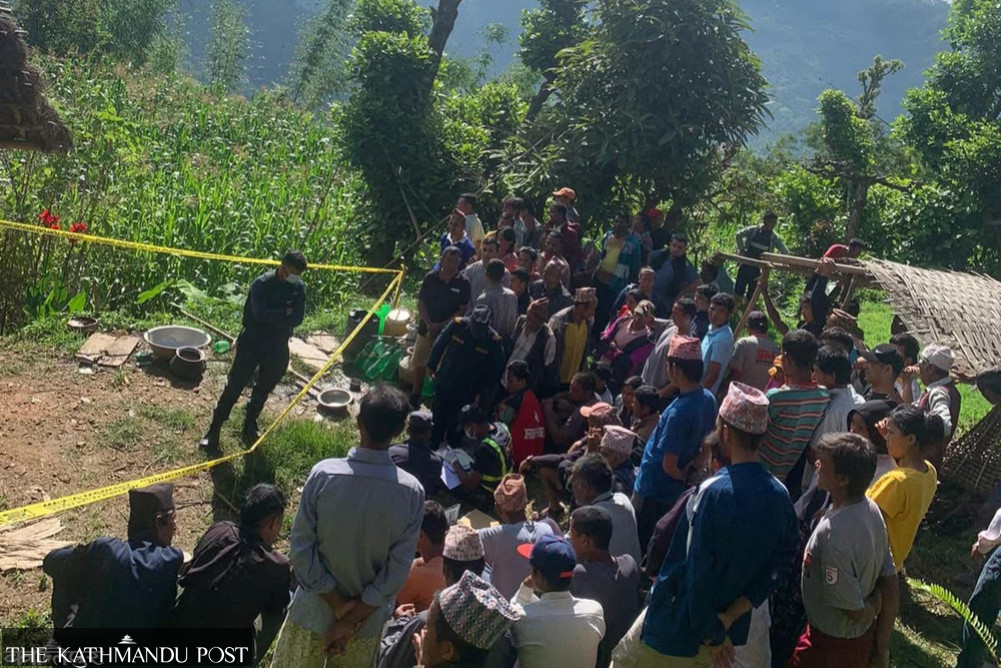Tragedy in Dhodlekhani: A Love Marriage Turns Deadly
In the tranquil village of Dhodlekhani, nestled within Nepal’s Bhojpur district, a harrowing incident unfolded on a quiet Saturday night. What began as a love story soon spiraled into tragedy when four members of one family were found dead under violent circumstances. The shocking event occurred in Ward 2 of Ram Prasad Rai Rural Municipality and has left the community reeling from the brutality of the act.
At the center of this grim episode is Rajendra Rai, a 30-year-old construction worker who allegedly took the lives of his wife, Manisha Giri, along with her father, mother, and younger brother. This disturbing act reportedly stemmed from ongoing tensions surrounding their inter-caste marriage, which had been met with resistance from Manisha’s family.
Rajendra and Manisha, who was just 16 at the time of their marriage nine months ago, chose to defy societal norms by entering into a union that crossed caste boundaries. Despite their hopes for acceptance, the Giri family struggled to come to terms with their daughter’s decision. Rajendra had been staying at his in-laws’ home for several days, attempting to convince them to allow him to take Manisha back to their shared residence. However, repeated refusals from Manisha’s family only served to heighten the already palpable tension within the household.
According to an investigation officer involved in the case, Rajendra’s determination to bring his wife home ultimately turned deadly. On the fateful night of the murders, a heated argument between Rajendra and the Giris escalated into violence. Rajendra later told authorities that he was initially attacked with a knife by his in-laws during the confrontation. He claimed to have wrested the weapon away and used it against them in a fit of rage.
The victims included Bel Bahadur Giri, 68, Manisha’s father; Manju Giri, 45, her mother; Sapan Giri, 9, her brother; and Manisha herself. Following the attack, Rajendra, visibly bloodied and injured, contacted the police and confessed to the crime, stating, “I have killed people. Come and arrest me.” Upon arrival, officers found him with a severe stab wound to his abdomen, which he alleged was inflicted by his in-laws during the altercation.
Rajendra was first taken to Bhojpur District Hospital before being transferred to BP Koirala Institute of Health Sciences in Dharan for more advanced medical care. Meanwhile, the bodies of the victims were initially transported to the local hospital in Bhojpur but were later moved to BP Koirala Institute of Health Sciences for autopsy due to limited forensic capabilities at the district level.
The repercussions of this tragic event have reverberated throughout the tight-knit community of Dhodlekhani. Residents remain in shock over the gruesome nature of the crime, struggling to comprehend how such a dispute could culminate in multiple fatalities. Local authorities have emphasized that the primary catalyst for the violence appears to have been the family’s refusal to accept the inter-caste marriage, underscoring lingering social challenges related to caste dynamics in rural Nepal.
Deputy Inspector General Ishwar Karki, head of the Koshi Province Police Office, noted that while conflicts over familial disagreements are not uncommon, the severity of this particular case highlights deeper societal issues. “It appears that the inter-caste marriage and the family’s rejection afterwards were the main reasons that led to such a heinous act of murder,” he remarked.
As investigations continue, officials are working to piece together the full sequence of events leading up to the fatal confrontation. Questions remain about whether there were any warning signs or opportunities for intervention prior to the outbreak of violence. Community leaders and human rights advocates alike are calling for increased awareness around issues related to caste discrimination and domestic conflict resolution strategies.
For now, Dhodlekhani remains shrouded in grief as residents grapple with the aftermath of a tragedy that has forever altered their peaceful existence. The once-quiet village now bears witness to a painful reminder of how unresolved tensions can erupt into unimaginable devastation.







